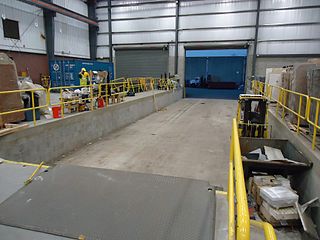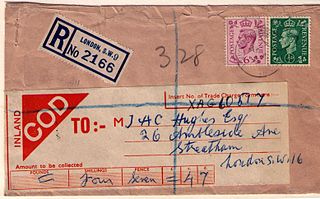Sales promotion is one of the elements of the promotional mix. The primary elements in the promotional mix are advertising, personal selling, direct marketing and publicity/public relations. Sales promotion uses both media and non-media marketing communications for a predetermined, limited time to increase consumer demand, stimulate market demand or improve product availability. Examples include contests, coupons, freebies, loss leaders, point of purchase displays, premiums, prizes, product samples, and rebates.
Discounts and allowances are reductions to a basic price of goods or services.

Geographical pricing, in marketing, is the practice of modifying a basic list price based on the geographical location of the buyer. It is intended to reflect the costs of shipping to different locations. There are several ways to apply the cost of shipping to the prices.

A warehouse is a building for storing goods. Warehouses are used by manufacturers, importers, exporters, wholesalers, transport businesses, customs, etc. They are usually large plain buildings in industrial parks on the outskirts of cities, towns, or villages.

FOB is a term in international commercial law specifying at what point respective obligations, costs, and risk involved in the delivery of goods shift from the seller to the buyer under the Incoterms standard published by the International Chamber of Commerce. FOB is only used in non-containerized sea freight or inland waterway transport. As with all Incoterms, FOB does not define the point at which ownership of the goods is transferred.

Delivery is the process of transporting goods from a source location to a predefined destination. Cargo is primarily delivered via roads and railroads on land, shipping lanes on the sea, and airline networks in the air. Certain types of goods may be delivered via specialized networks, such as pipelines for liquid goods, power grids for electrical power and computer networks such as the Internet or broadcast networks for electronic information. Car transport is a particular subgroup; a related variant is Autorack, which involves the transport of autos by railroads.
An invoice, bill or tab is a commercial document issued by a seller to a buyer relating to a sale transaction and indicating the products, quantities, and agreed-upon prices for products or services the seller had provided the buyer.
In law, a warranty is an expressed or implied promise or assurance of some kind. The term's meaning varies across legal subjects. In property law, it refers to a covenant by the grantor of a deed. In insurance law, it refers to a promise by the purchaser of an insurance about the thing or person to be insured.

Online shopping is a form of electronic commerce which allows consumers to directly buy goods or services from a seller over the Internet using a web browser or a mobile app. Consumers find a product of interest by visiting the website of the retailer directly or by searching among alternative vendors using a shopping search engine, which displays the same product's availability and pricing at different e-retailers. As of 2020, customers can shop online using a range of different computers and devices, including desktop computers, laptops, tablet computers and smartphones.

Personal selling occurs when a sales representative meets with a potential client for the purpose of transacting a sale. Many sales representatives rely on a sequential sales process that typically includes nine steps. Some sales representatives develop scripts for all or part of the sales process. The sales process can be used in face-to-face encounters and in telemarketing.

A credit note or credit memo is a commercial document issued by a seller to a buyer. Credit notes act as a source document for the sales return journal. In other words, the credit note is evidence of the reduction in sales. A credit memo, a contraction of the term "credit memorandum", is evidence of a reduction in the amount a buyer owes a seller under an earlier invoice.

Ticket resale is the act of reselling tickets for admission to events. Tickets are bought from licensed sellers and then sold for a price determined by the individual or company in possession of the tickets. Tickets sold through secondary sources may be sold for less or more than their face value depending on demand, which tends to vary as the event date approaches. When the supply of tickets for a given event available through authorized ticket sellers is depleted, the event is considered "sold out," generally increasing the market value for any tickets on offer through secondary sellers. Ticket resale is common in both sporting and musical events.
Consignment is a process whereby a person gives permission to another party to take care of their property and retains full ownership of the property until the item is sold to the final buyer. It is generally done during auctions, shipping, goods transfer, or putting something up for sale in a consignment store. The owner of the goods pays the third-party a portion of the sale for facilitating the sale. Consignors maintain the rights to their property until the item is sold or abandoned. Many consignment shops and online consignment platforms have a set time limit at which an item's availability for sale expires. Within the time of contract, reductions of the price are common to promote the sale of the item, but vary by the type of item sold.
A marketing channel consists of the people, organizations, and activities necessary to transfer the ownership of goods from the point of production to the point of consumption. It is the way products get to the end-user, the consumer; and is also known as a distribution channel. A marketing channel is a useful tool for management, and is crucial to creating an effective and well-planned marketing strategy.

Cash and carry is a type of operation within the wholesale sector.
Order processing is the process or work-flow associated with the picking, packing, and delivery of the packed items to a shipping carrier and is a key element of order fulfillment. Order processing operations or facilities are commonly called “distribution centers” or “DC 's”. There are wide variances in the level of automation associating to the “pick-pack-and-ship” process, ranging from completely manual and paper-driven to highly automated and completely mechanized; computer systems overseeing this process are generally referred to as Warehouse Management Systems or “WMS”.
An online grocer is a supermarket or grocery store that allows ordering via websites or mobile apps. The order can either be collected by the customer or delivered to the customer by drivers engaged by the grocer, a food delivery service, or by delivery drones and robots.

Omnichannel retail strategy, originally also known in the U.K. as bricks and clicks, is a business model by which a company integrates both offline (bricks) and online (clicks) presences, sometimes with the third extra flips.

Cash on delivery (COD), sometimes called payment on delivery, cash on demand, payment on demand or collect on delivery is the sale of goods by mail order where payment is made on delivery rather than in advance. If the goods are not paid for, they are returned to the retailer. Originally, the term applied only to payment by cash but as other forms of payment have become more common, the word "cash" has sometimes been replaced with the word "collect" to include transactions by checks, money orders, credit cards or debit cards.
The retail format influences the consumer's store choice and addresses the consumer's expectations. At its most basic level, a retail format is a simple marketplace, that is; a location where goods and services are exchanged. In some parts of the world, the retail sector is still dominated by small family-run stores, but large retail chains are increasingly dominating the sector, because they can exert considerable buying power and pass on the savings in the form of lower prices. Many of these large retail chains also produce their own private labels which compete alongside manufacturer brands. Considerable consolidation of retail stores has changed the retail landscape, transferring power away from wholesalers and into the hands of the large retail chains.











